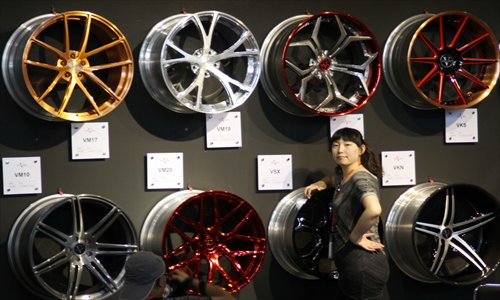Pop the hood

Wheels are displayed at the China International Auto Parts Expo on September 14, 2013. Photo: CFP
Repairing or changing auto parts in China is expensive, especially for an imported car, Zhang Wei, a Beijing-based car owner, told the Global Times Sunday, adding that the costs have put him off buying imported cars.
As the world's largest auto market for the last five years, China now has more than 127 million vehicles, second only to the US, which has 250 million, media reports said.
This huge amount of vehicles means there is considerable potential for the country's auto repair and maintenance business.
It is estimated that the revenue of the auto after-sales service sector in China, which mainly includes repair and maintenance, will reach 700 billion yuan ($113.83 billion) in 2015, Shanghai-based China Business News reported Thursday. The report also said the profit from after-sales services is about three times the profit from vehicle sales.
However, there are still relatively few large auto repair and maintenance companies in China, and overseas companies that have tried to expand into the Chinese market have encountered difficulties. Experts attributed this to the dominant position of carmakers and authorized 4S dealerships in the after-sales service market.
High prices
The price of after-sales services is high, especially in official 4S - short for sales, service, spare parts and surveys - dealerships. It can be as much as three times the price in unofficial repair stores, Zhang said.
Usually, changing a part costs more than a repair, so 4S shops tend to change parts rather than repairing them, Zhang said, noting that ordinary car owners who do not have professional knowledge about auto technology have no choice but to pay for the new parts, even if they have doubts about the advice they are receiving.
As well as the expensive parts, 4S shops also charge high labor prices for repairs, but customers have no idea what standard the labor cost is based on, he said.
"The only thing you can do is to pay the bill," Zhang said.
"The price of repairs and new parts is much cheaper in unofficial auto repair stores, but I won't choose them, because of quality concerns," he noted.
There are two kinds of auto parts in the market - parts from original equipment manufacturers (OEM), and aftermarket parts - Li Jingsheng, deputy secretary-general of the China Association of Automobile Manufacturers (CAAM), told the Global Times on March 10.
At 4S dealerships, they exclusively provide OEM parts, which in theory have more reliable quality, Li said.
The quality of aftermarket parts produced by other firms cannot be guaranteed, and customers take a certain amount of risk if they choose unofficial repair shops, Li noted.
Zhang Yu, managing director of Shanghai-based Automotive Foresight Co, told the Global Times Thursday that only about 20 percent of aftermarket parts meet proper quality standards.
Aftermarket parts often contain low-quality or counterfeit items, and in 2013, more than 70 percent of the complaints in the Chinese auto industry were about auto parts, the China Business News report said.
Carmakers only supply parts and technology for repairs to 4S shops, so it is hard for unofficial repair stores to compete in the market, Zhang Yu said.
Dominant position
The dominant position of carmakers and 4S shops in auto repair and maintenance is mainly due to China's management rules for auto brands, Dong Yang, secretary-general of the CAAM, told the Global Times on March 10.
The rules, which were released in 2005 by the Ministry of Commerce, say that automakers have the right to require suppliers to supply parts only to appointed dealers.
The supply chain for auto parts is monopolized by automakers, leading to high prices of the parts, Shen Jinjun, secretary-general of the China Automobile Dealers Association, was quoted as saying by the China Business News report, pointing out that it is customers who pay the price for this.
The average annual repair and maintenance cost for an imported car in China is twice or even three times the cost in Europe, the report also said.
The administrative rules have been under discussion for some time and a revision is expected, Dong said.
Automakers believe that dealers should be responsible for auto parts' quality and that they should buy parts from suppliers approved by the automakers, according to Dong. But dealers believe they are restricted by these rules, he said.
Local auto parts suppliers are also hurt by the restrictions, because it is hard for them to build brands and boost their reputation, Guangzhou-based newspaper Yangcheng Evening News reported Thursday.
The closed auto parts supply chain also makes it hard for unofficial repair and maintenance stores to develop in China, Zhang Yu said, noting that while large auto repair firms are common in overseas markets, they are rare in China.
In Europe and the US, automakers are required to provide parts as well as repair technology to unofficial as well as official dealerships. So unofficial repair firms can also develop well in the market, according to Zhang Yu.
But in China, it is hard for auto repair firms to develop into a large brand due to the closed supply chain for auto parts, Zhang Yu noted.
Carmakers disclose information about their parts supply and repair technology in overseas markets but keep this information hidden in China because of loopholes in Chinese law, Yu Weijiang, a director at the Ministry of Transport, was quoted as saying by the Chinese Business News report.
The current administrative rules for auto brands are biased in favor of automakers, but rules for durable consumer goods such as vehicles should give higher priority to customers' benefits than manufacturers or dealers, Dong said.
In response to the concerns in the market, the National Development and Reform Commission (NDRC) is conducting an antitrust investigation into the auto parts sector, Xu Kunlin, head of the NDRC's Price Supervision and Inspection and Antitrust Bureau, said at a press conference on February 19.